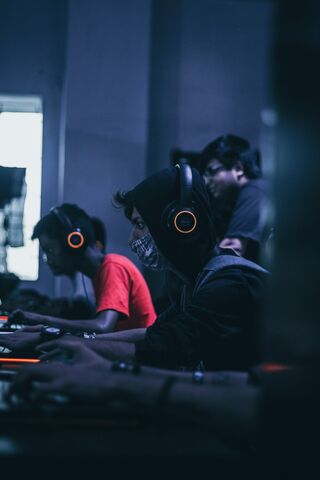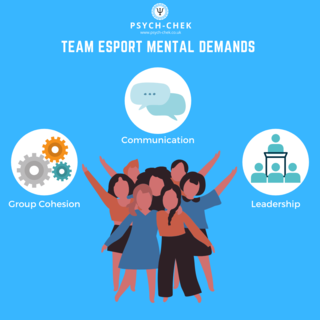Leadership
What Esports Teams Need To Know
“We’re all in this together.” The importance of teamwork.
Posted June 22, 2020 Reviewed by Lybi Ma

Just like there are team-based traditional sports, there are team-based esports. Well-known team-based traditional sports include Rugby, Football, Netball, Hockey, American Football, and Basketball. Team-based esports include Valorant, Counter-Strike: Global Offensive (CS:GO), League of Legends (LoL), DOTA 2, and Tom Clancy’s Rainbow Six Siege. The ability to work well within a team is vital for optimal esports performance. Dr. Matt Smith, Dave Bright, and I (Phil) recently published a study investigating the stressors and coping strategies of elite competitors in a team esport; CS:GO. The research revealed the challenges faced by competitors with respect to communicating and working in a team. The study received global media coverage from major outlets such as Wired.com, which shows the interest in the area.
Communication
One crucial component of any great team is their ability to effectively and efficiently communicate with one another and the surrounding support staff. The importance of communication when working in a team is very evident in the recent documentary, The Last Dance, which captures the dominance of the Chicago Bulls Basketball team in the 1990s. One cannot deny that having arguably the best NBA player of all time, Michael Jordan, significantly contributed to the Bulls’ dominance. However, it is evident that the Bulls’ communication was generally very effective both on and off the court. To function as a team there needs to be clear and open communication channels between the sender and receiver. This will help guide the actions and behaviours of the team.
Despite the Bulls’ unprecedented double three-peat (winning the NBA championship in three successive seasons on two occasions), there were times where communication between teammates during performance and with the management off the court was not so effective, which seemed to hinder the team’s performance and well-being. In a similar manner, poor communication can be a barrier to performance and well-being in esports. Given that decision making in esports, such as CS:GO, are arguably more frequent and fast-paced than traditional sports, like Basketball, you could make a strong case that communication is even more important in esports than it is in traditional sports.
Team Cohesion
Being able to work like a well-oiled machine is important for any sports team as well as any esports team. In team esports, each teammate is likely to have a role. Their ability to clearly understand their role, accept their role, and synchronise it with meeting the needs of the team is crucial to success. Similar to how ‘the offensive line’ protects the ‘quarterback’ in American Football, the ‘support’ protects the 'ADC' (Attack-Damage Carry) in LoL. Understanding your role is therefore very important for the greater good and success of the team. Just like in traditional sports, if a team member wants all the glory for themselves, roles may be lost and team functioning and success may be dramatically hindered. In our study examining stressors of CS:GO competitors, we found that stress was caused by some players thinking that their teammates were playing for themselves to get better performance statistics. These players seemed overly focused on their own performance rather than that of the overall team. This highlights the need for team members to be on the same wavelength with respect to collective goals.
Leadership
Another major finding of our research on stress and coping in CS:GO was the importance of leadership behaviours. Similar to how a captain in a traditional sport like Rugby may provide feedback to the team if things aren’t going well, our research showed this in CS:GO. The feedback given from the in-game leader (IGL) resulted in teammates experiencing greater stress when feedback was perceived to be overly aggressive in nature. Some players even said they were being screamed at by their IGL. This may seem quite surprising at first glance, yet communication of this nature is common in some captains in traditional sports.
One of the main differences between a captain in a traditional team sport and an IGL in a team esport like CS:GO is that the latter arguably single-handedly coordinates how the team is going to play. The importance of the IGL is huge but so is the responsibility of ensuring effective communication. The IGL must learn how to effectively communicate with their team to get the best out of them. Each member of the team will undoubtedly have a different preference of communication that also needs to be considered. Get the communication ‘right’ (e.g., clear and composed) and the team may flourish. Get the communication ‘wrong’ (e.g., lack of clarity and aggressive tone) and the team may suffer, both in performance and well-being. This highlights a need for team leaders to develop leadership styles and provide feedback that promotes optimal team functioning. Just as you need great leaders in traditional sports, you also need great leaders in esports.

Final words
- Clear and open communication channels between the sender and receiver are vital to promoting effective group functioning in esports teams.
- Understanding one’s role within a team and having collective group goals is key for the team to be ‘on the same wavelength.’
- Leaders and teammates would benefit from feedback being provided in a non-aggressive manner and where possible, be tailored to the specific needs of the team member.
This post doesn’t cover all the demands an esport team faces but provides an introduction to the world of esport teams through a psychological POV. It’s important to remember that each individual game within esports, just like each individual traditional sport, differ in the psychological demands placed on the team. Esports also place unique demands on competitors that play in a team, such as living with teammates, trusting in each other, and collective team belief to name a few. Future blogs will expand on these psychological demands.
Join us next time where we highlight the impact of social media on esports athletes!


